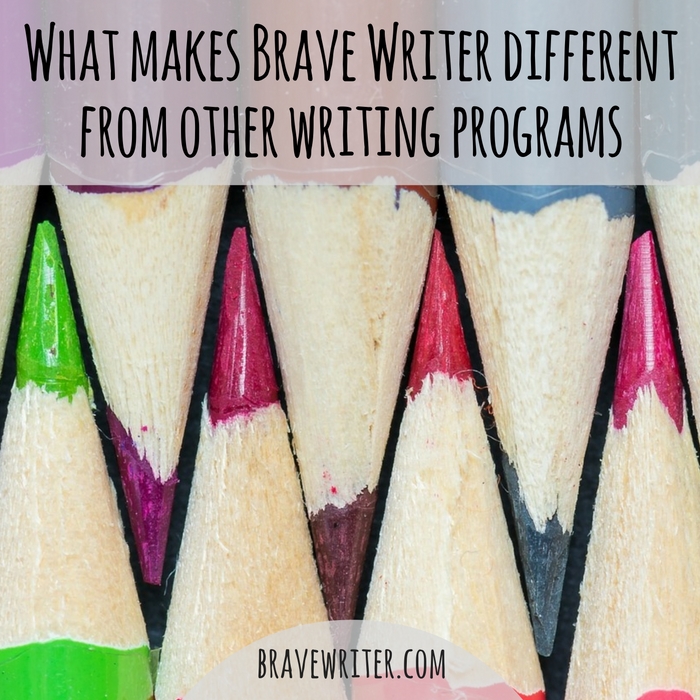
Yeah, I get emails.
In the emails, I get questions like these:
- What do you think of X writing program?
- How does your program compare to X?
- When I finish with your program, what can I use to learn real writing? (!?!)
Because I like to speak with some intelligence on these matters (and not just tell the emailer what she wants to hear – that Brave Writer is better than them all :)), I spend time clicking around the Internet reading what other writing programs put out for consumption.
A few commonalities leap off the screen if you take the time to scroll through sample pages.
First of all, there is a lot of bad writing out there. It never fails to amaze me that the primary writing materials are poorly written. What do I mean by poor? Do I mean they can’t spell or they mis-punctuate? Not usually. I mean, my eyes glaze over and I itch to click out of the screen. If the writing used to persuade the customer to buy the writing product is lifeless, impersonal or written in the passive voice, how does that bode for the actual product?
Worse, if the samples of the writing program are tedious, unimaginative or stilted, why would I be expected to think the program will produce quality writing in my child? That’s when I sprint the other way no matter how neatly organized the daily lesson plan looks in the floral spiral binder.
The primary goal of any writing program ought to be the production of compelling writing.
That is, writing that is interesting to read. Just because the writing is clear or neat doesn’t make it good writing. If you don’t enjoy reading it, it isn’t good writing. Period. Trust yourself. You know good writing when you read it.
One other thing I noticed on my Internet sojourn:
Lots of programs believe in direct imitation of writing models. The program provides a model and then asks the child to put it into his or her own words. Imitation of quality writing is a long-heralded writing principle. Yet I can’t help but be uneasy about the present style of imitation common to homeschooling curricula. In one case, the model was so poorly written (condescending, unimaginative, vague, and riddled with passive voice), I shuddered to imagine children being taught to imitate that writing as though that would help them become quality writers themselves.
The truth is, writing benefits from two things:
- Discovering one’s own voice.
- Allowing other voices to color and enhance yours.
The way I see it: work on getting in touch with the power of having something to say first.
Read lots. Read widely. Read a variety.
Narrate, talk, imagine, freewrite. Then consider imitating a style or a genre, or allowing for phrases and formats to influence how you present your writing voice.
We do this in Brave Writer. We spend a lot of time cultivating writing voice first. Freewriting and narrating provide the primary ways kids get in touch with having something to say.
For example:
- We give them interesting questions that probe their imaginations and thoughts.
- We give them interesting ideas to consider.
- We give them opportunities to interact with those ideas without also worrying about how their writing is coming out in that delicate phase where they tentatively develop an insight but don’t yet have mastery over the language to explain it.
Simultaneous to encouraging voice, we read quality literature, we study it for its literary elements, we try our hand at short poems or creating metaphors or paraphrasing research materials. We use models such as The Just So Stories or expository essays when we learn a new format.
But all the while, the primacy of a child’s quirky, personal, unique, important voice is cultivated and celebrated.
The finished products of our students bear little resemblance to each other. Instead, they reveal individual persons engaged with interesting material, sharing it with an interested audience. Once a child knows what she wants to say, she can then determine how to say it. If that includes copying someone else’s style, then wonderful! But not a minute before.
Homeschool shoppers are vulnerable to being seduced into purchases that look slick but deliver little in terms of real writing instruction.



















